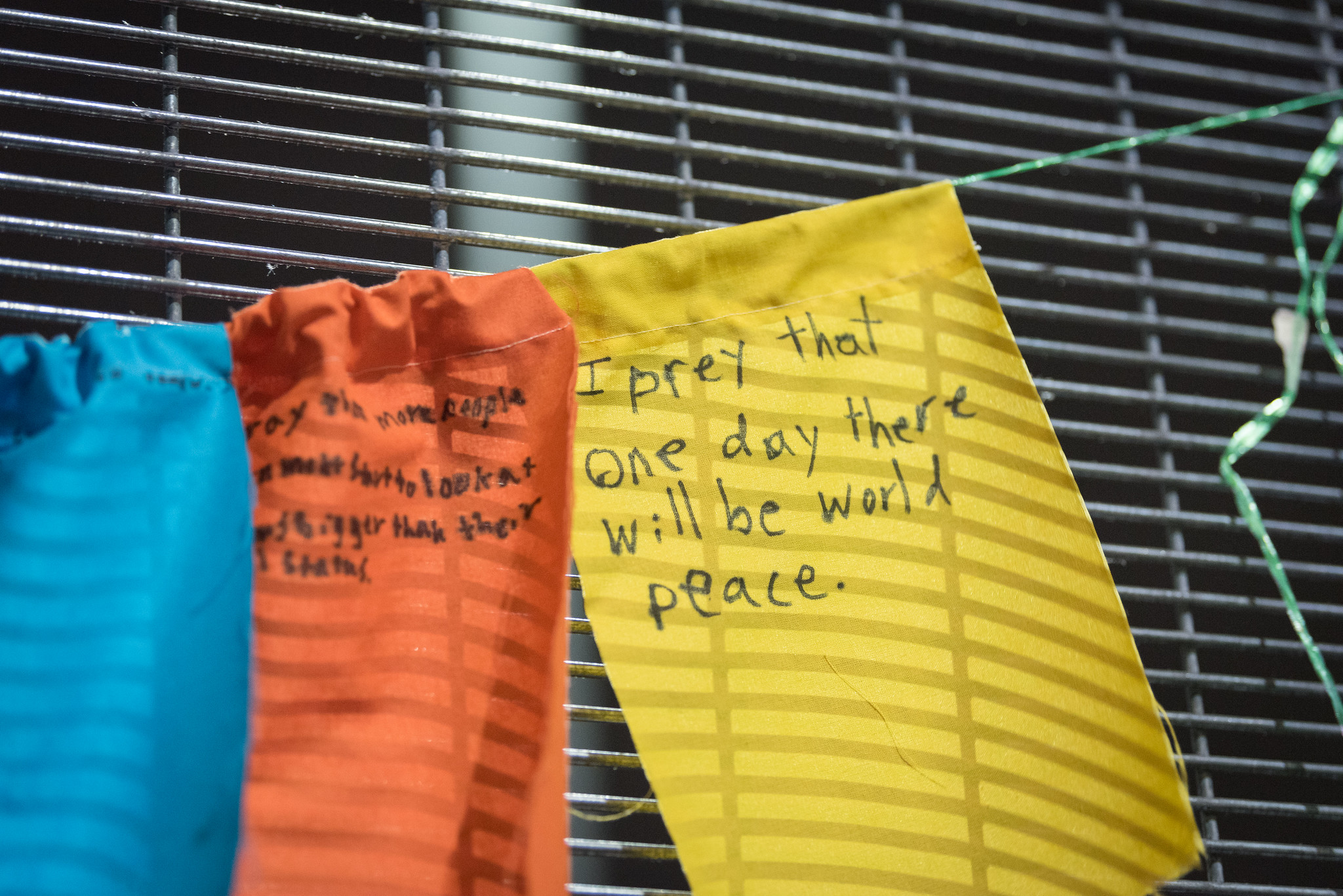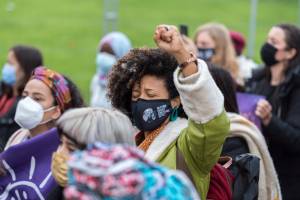This post comes to PHP from Sharah Luciano, a young woman from the global south who attended her first United Nations Conference on Climate Change this year. Sharah is a Master’s Student in Education, Culture and Communication on Urban Periphery at the State University of Rio de Janeiro, Brazil. She is a member of the Fe no Clima Initiative (Faith in Climate), ISER. We have included Sharah’s original Spanish version below.
first United Nations Conference on Climate Change this year. Sharah is a Master’s Student in Education, Culture and Communication on Urban Periphery at the State University of Rio de Janeiro, Brazil. She is a member of the Fe no Clima Initiative (Faith in Climate), ISER. We have included Sharah’s original Spanish version below.
Author’s Note: The COP, as well as other important decision-making spaces, mainly consist of representatives of hegemonic groups. This fact, added to the pandemic that we are experiencing, in combination with the barriers that hinder the participation of young people, women, black people and indigenous people would have made it even more difficult for me to participate. Therefore, I offer my special thanks to the PC(USA), for granting me the necessary credential so that I could have access to the official spaces of the conference, and also to ISER, the institute of which I am a part, for fully supporting my going.
In the days that I was in Glasgow, I learned a lot, not only about the importance of debate and action on climate change, but especially about the strength and capacity for transformation that uniting by faith can bring about.
In 2021, we have been listening to scientists, researchers and researchers say for a long time that climate change is a real phenomenon that requires urgent attention and action. Recently, the report of the UN Intergovernmental Panel on Climate Change, the IPCC, was released and the results presented indicate the relationship between human action and global warming, as well as the urgency of acting to avoid or at least reduce the impact of natural disasters resulting from the rise in temperature on Earth. These actions involve a great change in the way of life, which we, as residents of this huge house that is our planet Earth, will need to adopt. In other words, we need to take better care of this “abode” that has been given to us.
At Fé no Clima, an initiative of ISER, whose mission is to contribute and support religious leaders to raise awareness of their faith communities in facing the climate crisis and of which I am part of the team here in Brazil, it was the space where I could for the first time having contact with the explicit intersection between faith and environmental care. And during this period, at the COP, this understanding became even stronger for me.
It is impossible to spell out what I experienced in Glasgow, not to mention the intense and diverse participation of people of faith both inside and outside the conference. They were men, women and young people of different religions, ages, colors and regions who together spoke to their groups, communities and beyond about the need to look and do our best for creation and for the common Home as a whole.
There were several times I saw and heard people of faith taking a stand, praying and taking the message that it is also a commandment of faith to defend the environment. And this defense was built in various ways, whether through the elaboration of declarations and petitions in which religious, religious and members of faith communities asked government officials to commit themselves to climate issues, whether by carrying out vigils, acts, moments of prayers and participating in marches. On all these occasions it was possible to hear a request for CLIMATE JUSTICE echoed by different voices.

A piece of cloth reads ‘I prey [sic] that one day there will be world peace’. Hundreds of ribbons and pieces of cloth – many of them with words of prayer – are tied to the fence forming the perimeter of the venue of COP26 in Glasgow. Photo: LWF/Albin Hillert

Led by members of the Indigenous Peoples constituency, civil society constituencies to COP26 march through the COP26 venue in protest against inaction on behalf of governments in the climate negotiations on the last day of COP26. Photo: LWF/Albin Hillert
During this COP I experienced two very special moments. The first one was being able to be alongside representatives of the Renovar Nosso Mundo Movement during the delivery of the #Reset21 petition to the environment secretary of the city of Rio de Janeiro, who was at the event representing the mayor of the Brazilian city. The document, signed by more than 20,000 people, was an appeal by people of faith for leaders to commit to climate issues. The second one was participating in the march for climate held on the Global Day of Action for Climate Justice. I marched, accompanying the block of faith, alongside men and women religious from different parts of the world and together we said loudly to the choir: “What do we want? Climate justice. When do we want? Now”.
In closing, I want to share that this rich and powerful experience of having participated in the COP, and being able to follow this movement of collectivity and union that involved people of faith, young people, indigenous people and black men and women, makes me believe and have more hope for the future. More than agreements sealed by political leaders, this conference reaffirmed the power of insurgent voices that fight for a purpose and for a more just and harmonious socioenvironmental world.
Normally, staff from the Compassion, Peace & Justice ministries would have journeyed to COP26. But with travel restrictions still in place due to the pandemic, the Presbyterian Hunger Program and the Presbyterian Ministry at the United Nations worked to keep the church updated on COP26 happenings through social media and blog posts and stayed in close contact with partners. We were thankful that our credentials could be used by our partners.
The work of the Presbyterian Hunger Program is possible thanks to your gifts to One Great Hour of Sharing.
Fe, unidad y razones para creer en el futuro: un poco de lo que vi en la COP26
Este texto es un informe de la experiencia de una joven negra del sur global que estuvo por primera vez en una Conferencia de las Naciones Unidas sobre el Cambio Climático.
La COP, además de otros importantes espacios de toma de decisiones, cuenta con un público formado principalmente por representantes de grupos hegemónicos. Este hecho, sumado al contexto de la pandemia que vivimos, contribuyó a que, en esta edición, las barreras que dificultan la participación de jóvenes, mujeres, negros e indígenas fueran aún mayores. Por ello, dejo mi especial agradecimiento a la Iglesia Presbiteriana de los Estados Unidos de América, por otorgarme la credencial necesaria para que pudiera tener acceso a los espacios oficiales de la conferencia, y también al ISER, del instituto del cual soy parte, por apoyar completamente mi camino.
En estos días que estuve en Glasgow aprendí mucho, no solo sobre la importancia del debate y la acción sobre el cambio climático, sino sobre todo sobre la fuerza y capacidad de transformación que puede traer la unión por fe en algo o en un propósito.
Estamos en el año 2021 y durante mucho tiempo hemos estado escuchando a científicos, investigadores e investigadores decir que el cambio climático es un fenómeno real que requiere atención y acción urgente. Recientemente, se dio a conocer el informe del Panel Intergubernamental de Expertos sobre el Cambio Climático de la ONU, el IPCC, y los resultados presentados indican la relación entre la acción humana y el calentamiento global, así como la urgencia de actuar para evitar o al menos reducir el impacto de los desastres naturales. resultante del aumento de temperatura en la Tierra. Y todas estas acciones implican un gran cambio en la forma de vida, que nosotros, como habitantes de esta enorme casa que es nuestro planeta Tierra, tendremos que adoptar. En otras palabras, debemos cuidar mejor esta “morada” que se nos ha dado.
En Fé no Clima, una iniciativa de ISER, cuya misión es contribuir y apoyar a los líderes religiosos para concientizar a sus comunidades de fe frente a la crisis climática y del cual formo parte del equipo aquí en Brasil, fue el espacio donde podría por primera vez tener contacto con la intersección explícita entre la fe y el cuidado del medio ambiente. Y durante este período, en la COP, este entendimiento se hizo aún más fuerte para mí.
Es imposible explicar lo que viví en Glasgow, sin mencionar la intensa y diversa participación de personas de fe tanto dentro como fuera de la conferencia. Eran hombres, mujeres y jóvenes de diferentes religiones, edades, colores y regiones que juntos hablaron a sus grupos, comunidades y más allá de la necesidad de mirar y hacer nuestro mejor esfuerzo por la creación y por el Hogar común en su conjunto.
Varias veces vi y escuché a personas de fe tomar una posición, orar y llevar el mensaje de que también es un mandamiento de fe defender el medio ambiente. Y esta defensa se construyó de diversas formas, ya sea mediante la elaboración de declaraciones y peticiones en las que religiosos, religiosos y miembros de comunidades de fe pidieron a los funcionarios del gobierno que se comprometieran con los temas climáticos, ya sea mediante la realización de vigilias, actos, momentos de oración y participación. en marchas. En todas estas ocasiones se pudo escuchar una petición de JUSTICIA CLIMÁTICA que se hizo eco de distintas voces.
Durante esta COP viví dos momentos muy especiales. El primero fue poder estar junto a representantes del Movimiento Renovar Nosso Mundo durante la entrega de la petición #Reset21 al secretario de Medio Ambiente de la ciudad de Río de Janeiro, quien estuvo en el evento en representación del alcalde de la ciudad brasileña. El documento, firmado por más de 20.000 personas, fue un llamamiento de personas de fe para que los líderes se comprometieran con los problemas climáticos. El segundo fue participar en la marcha por el clima celebrada en el Día Mundial de Acción por la Justicia Climática. Marché, acompañando al bloque de la fe, junto a religiosos y religiosas de diferentes partes del mundo y juntos dijimos en voz alta al coro: “¿Qué queremos? Justicia climática. Cuando queremos Ahora”.
Termino este breve texto, manifestando que esta rica y poderosa experiencia que fue haber participado en la COP, principalmente porque pude seguir este movimiento de colectividad y unión que involucró a personas de fe, jóvenes, indígenas y negros. , me hace creer y tener más esperanza para el futuro. Más que acuerdos sellados por líderes políticos, esta conferencia reafirmó el poder de las voces insurgentes que luchan por un propósito y por un mundo socioambiental más justo y armonioso.